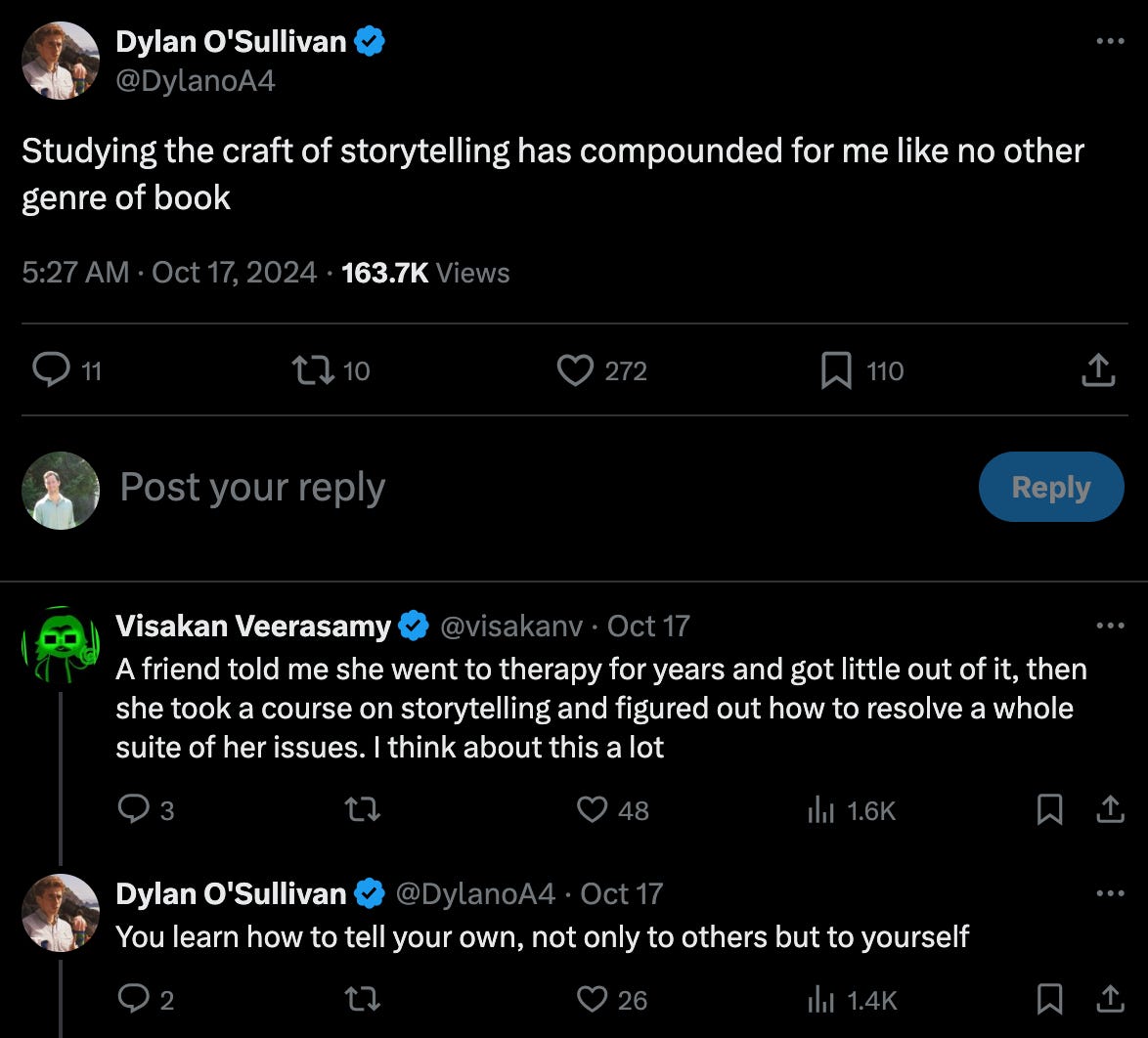I don’t think of myself as a very good storyteller, particularly in person. I feel self-conscious about spending too much time setting the scene and boring the listener, and I’m intimidated by the need for a big payoff at the end.
But it’s a skill I’d like to develop, and in the past month or so I’ve had a few nudges to learn how to tell better stories.
First, I saw this tweet:

Right around the same time, I really enjoyed Bob Gilbreath’s story about a big advertising pitch process, and he recommended I read the book Storyworthy1, by the Moth’s winningest storyteller, which has been very helpful in providing concrete tactics.
And last week, I listened to this podcast episode with Boyd Varty. Varty grew up on a wildlife reserve in South Africa and spent his youth tracking lions and leopards. He’s a wonderful storyteller (with a soothing South African accent), and in the episode he outlines the way he thinks about how to live a life filled with stories and tell them well.

The pieces of advice about storytelling that have stayed with me have ranged from mindset changes that border on the spiritual to tactical ways to better structure a story. The tactical things are faster and more concrete but it seems like storytelling has a powerful spiritual component that shouldn’t be overlooked.
More Spiritual:
Be someone who stories happen around. Varty emphasizes this in his interview: if you have the mindset of searching for stories in your life and being open to characters who deliver them, you’ll find more of them.
Write down the 1 moment each day that was most story-worthy. I have been doing this for a few weeks and it’s fun to see how quickly your brain starts to look for moments of meaning.
Practice stream-of-consciousness writing, where you write for ~15 minutes without stopping, ideally first thing in the morning. Storyworthy and The Artist’s Way (a canonical book on creative expression) both recommend a version of this. I’ve done this in the past and found it very impactful but difficult to stick to.
More Tactical:
The best stories are about a single 5 second moment in which a change took place. It’s helpful for the beginning of the story to be the opposite of this 5 second moment.
Compress events into a small time frame. Start the story close to the 5 second moment of change; 3 days is much more exciting to hear about than 3 months.
Every scene in a story should have a physical setting. It doesn’t need to be described in detail, it just needs to be there so that the movie in the audience’s mind can continue to flow.
Beginning a story with physical movement is helpful to immediately bring the audience into the narrative. You’ll notice how many movies begin with a sweeping shot of a landscape or the characters driving or running.
Stitching together scenes of a story with “therefore” or “but” provides the causality and tension the story needs to be captivating. “I walked through Dimes Square and then unexpectedly saw Dua Lipa” is less interesting than “I wasn’t expecting anything special when I walked through Dimes Square — but then I saw Dua Lipa.”2
I’ve been tentatively practicing these things and it has been fun to experiment with. If any of you have methods that have worked for you I’d love to hear them…the better I am at telling stories the more fun it will be to read my little articles!
Have a great weekend.
Some book links here are affiliate links, meaning I get a percentage if you buy something through it. Someone bought the excellent The Art of Gathering last week and I made 8 cents, which I immediately reinvested into R&D
This did not happen; I did not see Dua Lipa.


on a number of occasions, i've considered writing a piece synthesizing the best storytelling tips i've picked up along the way. after reading yours, i'm relieved i no longer need to write it. well done. also, boyd's the goat. have you listened to his original ep on invest like the best?
I’m happy that my nudge helped move you! There’s truly some great self-improvement in commitment to storytelling. First, your point on embracing whatever happens in life as a potential story (and learning) opportunity. Second, as we evolve and grow, we look back on our life stories differently. Watching your own change in narrative is proof of personal growth.